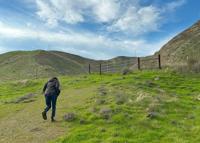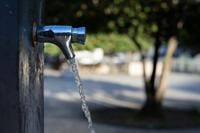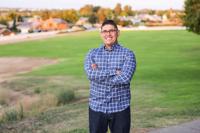My presence in nature is something I began to seriously question as I got older. With age, I began to have more access to California’s natural landmarks and national parks, such as Yosemite National Park, Los Padres National Park, Morro Bay, the Santa Cruz Mountains and Lake Arrowhead. I also began to feel more guilty.
These are places I had never seen before as a child or teenager, and now, as a young adult, every time I step into nature and green spaces, I think of my parents and the millions of Latinos and people of color who are far less likely to have immediate access to nature.
This past weekend, I uncovered a new nature-filled paradise, known as the Paicines Ranch, located in central California, east of Pinnacles National Park. The ranch, which consists of approximately 7,000 acres of rangeland, 550 acres of row crop ground and 25 acres of vineyard, is home to a diverse ecosystem of trees, animals, bodies of water and incredible cliffs.
When I leave the busy and rapid city life in South Central LA for a nice field of grass, surrounded by singing birds and mountains, I feel grateful for the opportunity to experience the world in such a beautiful way—but I also feel shame and guilt. Am I wrong for enjoying this without my parents? Why am I here? Why can’t it be all of us? Will they ever get to experience this? Will they ever allow themselves to?
Those are just some of the questions that run through my mind on trips like this.
I know that national parks or natural landmarks are places where we can experience awe and inspiration. They are places that have helped me change my perspectives and strengthen my relationships with nature; they have also been places of healing, comfort and relief from the chaotic world that I sometimes live in. But I also know they are places of privilege.
Not seeing Latinos, Black, Indigenous or people of color recreating in nature isn't because they just don’t want to be there; it's because they can’t. Not everyone can afford to buy the necessary gear to camp, climb, hike or do anything else outdoors. Many Latinos tend to have higher unemployment rates and lower income levels, leading to less disposable income to take trips for outdoor recreation.
According to the Hispanic Access Foundation, U.S. communities of color are three times as likely to live in “nature deprived” places, compared to white communities. This means Latinos and other people of color live in places where there are fewer parks, forests, streams, beaches and other natural places. In addition, even though Latinos are part of one of the fastest-growing populations in the U.S., they only make up about 11 percent of people who regularly do outdoor recreation, in comparison to white people, who make up 72 percent.
“I wish I could take some days off” or “I would if I wasn’t so tired from work,” are just some of the things my mon says when I encourage her to visit a national park with me. Hearing that from her used to get me so upset, until I began to understand and have empathy for the way that nature and connecting with nature were never her priority or even something she felt was accessible.
As someone who grew up poor in a rural part of Mexico and immigrated to the United States to give me a better life, her priorities have always been security and working hard. And even now that we have more financial security in our home, her mindset is deeply rooted in scarcity, making it hard for her to take time off work to swim in rivers or sleep below the stars without feeling guilty.
Unfortunately, I have also witnessed the big gap in access to recreational areas for the Latino community. The inequities do not only exist in the proximity and location of these parks; they also exist in the language barriers that exist among these spaces. During my time in Yosemite and most recently at the Paicines Ranch, I realized that these places are not meant for Spanish-speaking Latinos. They are designed or catered to those who only speak English, unlike my parents.
As I walked down hiking trails, I realized that most, if not all, directional markers, history and facts on signage were only available and written in English.
As global warming creeps up on us year by year, I also worry if my parents, my kids or my grandchildren will get to experience nature, parks and environmental landmarks the way I have. It frightens me to think that there could be many generations of people who will not be able to learn and soak in nature's treasures due to environmental warming impacts. I know that, like me, there are many Latinos experiencing first-generation guilt, who feel guilty that they can enjoy nature while their parents still don’t have the money or paid time off to do so. I feel guilty that my parents' sacrifices helped me gain access to these places that they didn’t have.
Every time I leave L.A. on a trip like the one I just took to Paicines Ranch, I text my mom an infinite number of pictures per her request and when I come home, she asks me to tell her everything I saw in detail. “Qué bueno, hija,” she tells me.
I like to think that one day my mom will feel welcome and at home in nature. As for now, I continue to learn how to replace my guilt with gratitude, hoping to also be the bridge to a future where my family is connected to nature and where that kind of life does not seem so far away.











(0) comments
Welcome to the discussion.
Log In
Keep it Clean. Please avoid obscene, vulgar, lewd, racist or sexually-oriented language.
PLEASE TURN OFF YOUR CAPS LOCK.
Don't Threaten. Threats of harming another person will not be tolerated.
Be Truthful. Don't knowingly lie about anyone or anything.
Be Nice. No racism, sexism or any sort of -ism that is degrading to another person.
Be Proactive. Use the 'Report' link on each comment to let us know of abusive posts.
Share with Us. We'd love to hear eyewitness accounts, the history behind an article.